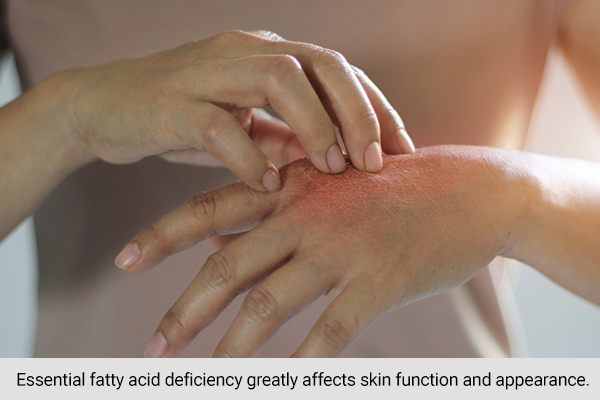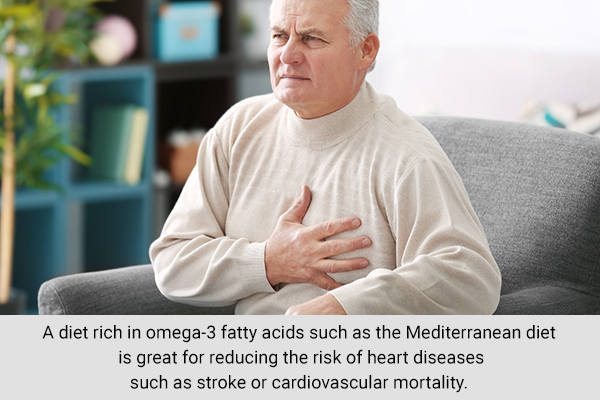In this article:
Omega-3 fatty acids are polyunsaturated fatty acids (PUFAs) that are very important for your body’s healthy functioning.

Since your body cannot make these fats on its own, they are a type of fat you should include in your diet. This is why omega-3 fatty acids are called essential fats.
Omega-3 fatty acids are immensely important because:
- They are an integral part of cell membranes.
- They are required for making hormones.
- They regulate genetic function.
Moreover, these fatty acids protect your body from various health issues such as: (1)
- Heart diseases
- Lupus
- Eczema
- Rheumatoid arthritis
- Cancer
Therefore, maintaining a sufficient intake of omega-3 fatty acids is a must for healthy functioning.
Signs and Symptoms of Omega-3 Fatty Acid Deficiency
The signs and symptoms of omega-3 fatty acid deficiency can include the following.
1. Dry skin or poor skin health

Omega-6 and omega-3 polyunsaturated fatty acids play a crucial part in healthy skin functioning and appearance.
A series of studies demonstrated that oils rich in polyunsaturated fatty acids (corn oil, linseed oil) may totally reverse the skin defects in animal models with a deficiency of these fatty acids.
Therefore, it can be said that essential fatty acid deficiency greatly affects skin function and appearance such as hyperproliferation of the epidermis, dermatitis, and increased water loss through the skin’s surface leading to dry skin. (2)
2. Sudden joint pain
Omega-3 fatty acids appear to prevent experimental arthritis. This also means that omega-3 fatty acids may be useful in the treatment of arthritis.
Clinical researchers have demonstrated that omega-3 fatty acids may have a positive effect on the treatment of swollen and tender joints.
So, if you’re having increased joint pain or soreness, you may need to up your omega-3 fatty acid intake. (3)
3. Mental health problems

Mental health is essential for holistic well-being. Good mental health ensures that you realize your potential, can cope with everyday stress, can function productively and constructively, and are able to contribute to your community.
Nutrition plays a vital part in mental health as the brain depends on both macro- and micronutrients for proper development and adequate functioning. Therefore, a deficiency of any essential nutrient, particularly that of omega-3 polyunsaturated fatty acids, can come up as a potential risk factor for mental illness.
Omega-3 fatty acid deficiency has been reported in patients with psychiatric problems. (4) These issues can include:
- Depression
- Bipolar disorder
- Stress
- Dementia
So, if you’re feeling not up to the mark or facing mental health issues, you may want to check your omega-3 levels.
4. Visual symptoms such as sensitivity to bright light
Visual symptoms such as poor night vision, sensitivity to bright light, or visual disturbances are often associated with a deficiency of omega-3 fatty acids. (5)
A cohort study within a multicenter clinical trial was performed to examine the progression of age-related macular degeneration (AMD). The study concluded that participants who consumed more omega-3 fatty acids had a decreased risk of developing age-related macular degeneration (AMD). (6)
Another study found that omega-3 fatty acids play a role in treating dry eye syndrome as a dietary intervention with omega-3 fatty acids caused an improvement of symptoms. (7)
So, if you’re struggling with itchy eyes that are red and painful, it is worth including omega-3 fatty acids in your diet.
5. Mood swings

Low dietary intake of omega-3 fatty acids is linked to variability in mood, behavior, and personality. According to the findings of a study, omega-3 fatty acids are associated with variability in affect regulation and impulse control.
A clinical trial of fish oil supplementation, which is rich in omega-3 fatty acids, reported improvements in mood and reaction time in participants. (8) Therefore, a change in your mood or other behavioral issues can point to a deficiency of omega-3 fatty acids.
6. Hair loss
While losing a few strands every day is not a major issue, unreasonable hair loss where it is not replaced by new hair is a cause for concern as this can lead to hair thinning and even baldness in severe cases.
A number of reasons are associated with hair loss such as genetics and stress. But hair loss can also occur due to a lack of nutrients in the body; one such nutrient is an omega-3 fatty acid. Hair loss as a result of nutritional deficiency is primarily due to the scarcity of omega-3 fatty acids in a diet.
Studies have shown that supplementation with omega fatty acids and antioxidants significantly improved hair density and reduced hair fall. (9)(10)
7. Heart issues such as increased resting blood pressure

According to studies, omega-3 fatty acids have beneficial cardiovascular effects.
In a research trial, patients randomly assigned to omega-3 fatty acids experienced a significant decrease in the inflammatory response in the body. Additionally, omega-3 fatty acids also decreased resting systolic and diastolic blood pressure. These results indicate that omega-3 fatty acids can help maintain healthy blood pressure.
A diet rich in omega-3 fatty acids such as the Mediterranean diet is great for reducing the risk of heart diseases such as stroke or cardiovascular mortality. So, if you’re having trouble with your heart, you may need some omega-3 fatty acids to help you out. (11)
8. Other possible signs
A lot of other signs can be associated with an omega-3 fatty acid imbalance or deficiency. These include: (5)
- Increased allergic responses in conditions such as eczema, asthma, and hay fever
- Difficulty reading, such as letters appearing to move or swim or letters appearing blurry
- Sleep problems, including difficulties in sleeping at night and waking in the morning
Note: Any of these indications can have other causes instead of deficiency of omega-3 fatty acids, so it should not just be assumed that fatty acid deficiencies are accountable. It is better to seek medical help for any such symptoms before taking any supplements or making any significant dietary changes.
Recommended Dietary Allowance of Omega-3 Fatty Acids
- The recommended dietary allowance (RDA) for adult men is 1.6 g/day.
- The RDA for adult women is 1.1 g/day.
- The RDAs for pregnant women and breastfeeding women are 1.3 g/day and 1.4 g/day, respectively. (12)
Treating Omega-3 Fatty Acid Deficiency With the Right Diet
Omega-3 fatty acid deficiency can be solved with an improved diet. You can get the recommended amounts of omega-3 fatty acids by consuming the following: (2)(11)
- Salmon
- Mackerel
- Herring
- Tuna
- Anchovy
- Bluefish
- Sea bass
- Walnuts
- Chia seeds
- Flaxseeds
- Soy foods
- Canola oil
Note: Since omega-3 is an essential fatty acid that is needed by the body to remain healthy, it should be well included in the diet. Only take omega-3 fatty acid supplements after consulting a doctor.
Most-Asked Questions About Omega-3 Fatty Acid Deficiency

Should I take omega-3 supplements?
You should take omega-3 fatty acid supplementation only after consulting a doctor.
What do EPA, DHA, and ALA mean?
There are two kinds of omega-3 fatty acids in fish:
- Eicosapentaenoic acid (EPA)
- Docosahexaenoic acid (DHA)
The form of omega-3 in plants is alpha-linolenic (ALA).
How do omega-3 fatty acids help improve my health?
Here’s how omega-3 fatty acids improve your health:
- Improve heart health by reducing the risk of cardiovascular diseases such as stroke or blood clots
- Lower inflammation and therefore reduce the risk of inflammatory diseases such as arthritis
- Support skin health and proper skin barrier function
- Prevent photodamage to the skin
- Improve nail and hair health
Final Word
Omega-3 fatty acids are vital for human life and healthy body functioning. They especially play key roles in brain development and function.
Since omega-3 fatty acids are a type of fat the body cannot make on its own, they must be provided by your diet. Thus, ensure that your diet provides you with sufficient amounts of omega-3 fatty acids.
- Was this article helpful?
- YES, THANKS!NOT REALLY


